- Home
- Christopher Paolini
The Fork, the Witch, and the Worm Page 7
The Fork, the Witch, and the Worm Read online
Page 7
Eragon just hoped the improvements would stick.
When he’d asked where they intended to go, Angela said, “Oh, to some distant shore, I should think. A place nice and isolated, where we don’t have to worry about unwelcome surprises.”
Over the past few months, Eragon had done his best to ferret out more answers from the herbalist—on a range of subjects—but he might as well have tried to cut through a wall of granite with a twig. She deflected and dissembled and otherwise stymied his efforts with perfect success. The one new thing he had learned was the story of how she and Solembum had first met—and that had made for a most entertaining evening indeed.
A strip of pink amid the overturned soil caught Eragon’s attention. He lowered his pick and crouched down to see a long, banded earthworm feeling its way across the clumps of fragrant earth.
“Here now,” he said, feeling sorry for having disturbed the worm’s home. He put his hand in front of the worm and allowed it to crawl onto his palm. Then he lifted the worm out of the plot, carried it a few feet away, and set it down near a clump of dry grass, where it might burrow back into the ground.
Shouts rang out from within the main hall: “Ebrithil! Ebrithil!” The elf Ästrith emerged from the shadowed doorway, covered in dirt and dust, a bloody scrape along her right forearm and a strained expression on her face.
The nape of Eragon’s neck prickled, old instincts taking hold. He sprinted back to the plot, grabbed the pick, and ran to Ästrith even as she said, “The tunnel we were working in collapsed. Two of—”
“Which tunnel?” Eragon asked, hurrying into the hall with her. Behind them, Saphira heaved herself to her feet and lumbered after.
“On the lowest level. The dwarves were trying to reopen a branch tunnel they found yesterday. The ceiling gave way, and two of them are trapped beneath the stones.”
“Did you tell Blödhgarm?”
“He will meet us there.”
Eragon grunted.
Together, they crossed the main hall and hurried down the stairs and through the door that granted access to the mining tunnels beneath the hold. As the cold underground air hit his skin, Eragon regretted not pausing to grab his shirt. Oh well.
For a few silent minutes, they hurried through the switchback tunnels, descending ever deeper into the side of Mount Arngor. Lanterns had been hung on the walls at regular, but sparse, intervals, and the shadows pooled thick and heavy between them.
In the back of his mind, Eragon felt Saphira keeping close watch. She said, How can I help? He could sense her frustration; the tunnels were too small for a grown dragon like her.
Just stand ready. I may need your strength.
As he and Ästrith neared the lower depths of the old mine, angry voices sounded ahead of them, echoing off the bare stone in a confusing chorus. A cloud of dust still clogged the air near the collapsed section, and three separate werelights hung near the ceiling, providing additional—if unsteady—illumination.
Four dwarves emerged from the haze; Eragon recognized them all. They had been digging through the rubble, stacking the broken pieces of rock on either side of the tunnel as they attempted to excavate their buried brethren.
Ästrith pointed at a huge slab of stone that lay across the narrow passageway. Several cracks, straight as an arrow, had split the slab into sections. She said, “I broke the rock, Ebrithil, so as to lift the pieces away, but if even one part is removed, the rest will settle farther, and I am not strong enough to hold all of them at once.”
The lead dwarf—a thick-bearded fellow by the name of Drûmgar—nodded. “She is right, Jurgencarmeitder. We need your help, and the help of the dragons.”
Eragon placed his pick against the wall and closed his eyes for a moment. Reaching out with his mind, he searched for the buried dwarves….There. Several feet ahead of him, a single consciousness, faint and faltering, like a candle in the wind.
Hadn’t there been two dwarves trapped in the cave-in?
Eragon didn’t dare wait any longer. He could feel the life ebbing from the one dwarf. “Stand clear,” he said.
Ästrith and the dwarves hurried back. Then Eragon drew upon his connection with Saphira—and through her, upon the Eldunarí in the Hall of Colors—and he spoke a single word of power: “Rïsa.”
The word was simple, but his intent was not, and it was intent that guided the execution of a spell.
Creaks and groans and shivering screeches rang out through the tunnel as the pile of fallen stone lifted off the ground. The cost in energy was immediate and immense; if not for the strength of the dragons, Eragon would have passed out and lost control of the spell.
Billows of fresh dust choked the air as Eragon pressed the stones back into the broken ceiling. He coughed, despite himself, and then said, “Melthna.”
At his magic-borne command, all the stones he held suspended flowed together, rejoining the surrounding walls, welding themselves back to the bones of Mount Arngor. A pulse of heat—hot enough to make Eragon’s cheeks sting and to singe the hairs on his chest—emanated from the now-solid casing of rocks.
He let out the breath he’d been holding and ended the spell. Thank you, he said to Saphira and, by extension, the Eldunarí.
As the dust settled, the wavering illumination of the werelights revealed the crumpled forms of the two dwarves lying in the tunnel ahead. Smears of blood surrounded them.
Drûmgar and the rest of the dwarves rushed toward their fallen compatriots. Eragon followed more slowly, still feeling the effects of the weirding he had wrought.
Then the dwarves groaned and began to pull at their beards and hair as they filled the mine with their lamentations. Eragon’s heart sank at the sound. Again he reached out with his mind, searching for any sign of life in the two broken bodies.
Nothing. Both were dead.
Fast as he’d been, he had still failed to save them. Eragon dropped to his knees, blinking back a sudden upwelling of tears. The names of the two dwarves were Nál and Brimling, and although Eragon hadn’t known them well, he’d seen them about the fire on many a late evening, and they had always been quick with a song or a joke and generally full of good cheer.
Ästrith put a hand on his shoulder, but it was a small comfort.
Eragon bent his head and let the tears fall free. For all the spells he had learned and powers he had gained since becoming a Dragon Rider—and for all the strength of the dragons—some things were still beyond him.
He could lift staggering amounts of stone with a word, but he couldn’t turn aside death. No one could.
* * *
—
The rest of the day passed in a grey blur. The dwarves took their dead to straighten their limbs, wash their bodies, dress them in fine garments, oil their beards, and otherwise prepare them for interment in tombs of stone, as was the custom of their people.
Eragon helped Blödhgarm—who had arrived late to the tunnels—and Ästrith further secure that branch of the mine, so as to prevent any future collapses. Then, heartsore and tired, he retreated to the eyrie and cast himself down next to Saphira for a restless hour of sleep.
He still felt grim, glum, and out of joint when evening arrived. The elves attempted to console him with various high-minded phrases, but their dispassionate reasoning did little to improve his outlook. Nor were the few other humans—including Nasuada’s personal envoy, one Marleth Oddsford—in any better mood. Most of them had labored hard alongside the dwarves throughout the winter, and the loss of Nál and Brimling had affected them even more than Eragon.
Yet Eragon did not forget his station. He did his duty and walked among the saddened dwarves, murmuring words of encouragement and comfort. Both Hruthmund and Drûmgar thanked him, and he promised he would attend the funerals the next day.
As the night wore on, Eragon found himself dra
wn to the hearth where the Urgals were gathered. They were loud and boisterous, and though they had no love for the dwarves, their leader, Skarghaz, raised his cup in honor of Nál and Brimling, and as a group, the Urgals let loose with a roar that rivaled Saphira’s.
Later still, when the others had retired, Eragon remained with the Urgals, drinking rekk—which the Urgals made from fermented cattails—while Saphira slumbered in the corner.
“Rider!” boomed Skarghaz. “You are too sad.” He was a broad, slump-shouldered Kull with long hair that he wore in a braid down his bare back. Even in the depths of winter, he rarely deigned to put on more than a crude vest.
Eragon wasn’t inclined to argue. “You are not wrong,” he said, overpronouncing his words.
The massive Kull took a swig of rekk from his equally massive cup. Then he beckoned toward another of the Urgals: a stout, somewhat potbellied Urgal with a long red scar that slashed sideways across his face. “Irsk! Tell our Rider a story to settle his liver. Tell him a story of the old times.”
“In this tongue?” Irsk replied. He grimaced, baring his fangs.
“Yes, in this tongue, drajl!” roared Skarghaz. And he tossed an empty cask of rekk at the smaller Urgal.
The cask bounced off Irsk’s horns. He didn’t duck or flinch, only grunted and lowered himself onto the stone floor in front of the fire. “Give me a drum, then.”
At Skarghaz’s order, one of the Urgals ran off to their quarters and soon returned carrying a small hide drum. Irsk set it between his legs and then paused for a moment with his thick-fingered hands resting atop the hide. He said, “I must change the words of the Urgralgra to those of your kind, Rider. They will not sound as they should, though I have studied how you speak for nigh on three winters now.”
“I’m sure you will do just fine,” said Eragon. He had already noticed that Irsk was more well-spoken than his fellow Urgals, and Eragon wondered if it was because Irsk had training as a bard or poet. He straightened in his chair and leaned forward, curious to hear what would come forth from the Urgal.
In the corner, Saphira cracked open her near eye to reveal a slit of gleaming blue.
Skarghaz pounded the base of his cup against his leg, splashing rekk across the floor. “Enough slowness, Irsk! Tell the story. Tell the one of great Kulkaras.”
Again, Irsk grunted. He lowered his chin for a moment and then struck the drum a single echoing blow and began to speak.
Despite the roughness of the Urgal’s words, there was a truth to them Eragon recognized. And as he listened, he felt transported to another time and place, and the events of Irsk’s tale soon seemed as real as the hall itself.
CHAPTER VIII
The Worm of Kulkaras
The day the dragon arrived was a day of death.
He came from the north, a shadow upon the wind. Soft and silent, he swept across the valley, blotting out the sun with his velvet wings. Where he landed, field and forest went up in flame, drifts of ash choked the streams, beasts fled—and Horned also—and the sounds of grief and terror rent the summer air.
The dragon was named Vêrmund the Grim, and he was an old and cruel dragon, canny in the ways of the world. Word of him had come from the north, but never had there been a hint or warning that he had forsaken his lair in those frozen, far-off reaches.
And yet there he was. Black as charred bone, with a polished gleam to his fitted scales and a throat packed full of fire.
The youngling, Ilgra, watched with her friends from beside the spring-fed pool where they so often swam, high in the foothills along the eastern side of the valley. From that vantage, she saw the dragon ravage their farms with fire and claw and the sweep of his jagged tail. When the warriors of Clan Skgaro attacked—attacked with bow and spear and ax—Vêrmund’s flame consumed them or else he trod upon them and thus made an end to their ambitions. Even the sharpest blade could not pierce his hide, and the Skgaro had no spellcasters to aid them in battle. As such, they found themselves at the mercy of the dragon, able only to annoy or inconvenience him, but not to stop him. Never that.
Like the evil worm he was, Vêrmund ate every person who came within his reach: male and female, elder and youngling alike. None were spared. Their livestock too he ate, corralled them with fences of fire and feasted upon the helpless animals until his chops were clotted with gore and the ground a crimson shambles.
All that and more Ilgra saw. She could do nothing to help, so she stayed by the pool, though to wait hurt as much as any wound. Those of her friends who weren’t so wise ran to join the fray, and of their number, many were lost.
As the dragon approached the hall of her family, Ilgra bared her teeth in a helpless snarl. Closer it came, and then closer still, and then with a slow-moving swipe, the scaled monster crushed her home.
A howl tore from Ilgra’s throat, and she sank to her knees and grasped the tips of her horns.
Relief tempered her anguish as she saw her mother scramble free of the wreckage and, with her, Ilgra’s younger sister, Yhana. But it was a fleeting relief, for Vêrmund’s head descended toward them, his heated maw parted.
From across the fields came sprinting Ilgra’s father, spear held high. The lightness of hope filled her heart. Her father was first among the Anointed. Few there were who could match his might, and though he was small compared with the dragon, she knew his courage was equal to that of the gods’. Four winters ago, a hungry cave bear had come prowling down from the mountains, and her father had faced it with nothing more than a knife in one hand and a cudgel in the other. And he had slain the bear, killing it with a slash to the flank and a hard blow to the head.
The skull of the beast had hung over their hearth ever since.
Of everyone in Clan Skgaro, Ilgra felt sure he could stop Vêrmund the Grim.
Even through the tumult, Ilgra heard her father shout challenges at the dreadful dragon and curses too. With slithering quickness, Vêrmund turned to face him. Undaunted, her father darted past the worm’s plow-shaped chin and drove his spear at a gap between the scales on Vêrmund’s plated neck.
The blade missed, and a sound as of metal striking stone reached Ilgra from the valley floor.
Chills of mortal fear crawled along her limbs as Vêrmund uttered a thunderous chuckle, strong enough to shake the earth. The dragon’s amusement angered her, and she gnashed her teeth, outraged. How dare it laugh at their misery!
To the last a warrior, her father loosed a cry and ran between Vêrmund’s legs, where it was difficult for the dragon to reach.
But the creature reared back and filled the mighty bellows of his lungs, and Ilgra howled again as a torrent of blue-fringed fire engulfed her father.
Then the heaviness of despair crushed Ilgra’s heart, and tears welled from her eyes.
Her father’s sacrifice was not in vain, though. While he had distracted Vêrmund, her mother and sister fled the dragon, and by the blessing of Rahna the Huntress, Vêrmund showed no interest in following but concentrated instead upon their herds.
With all the clan dead or scattered, Vêrmund was free to feast at his leisure. Ilgra remained sitting on the ground, and she wept as she watched. Survivors joined her in ragged groups, their clothes scorched and torn, and some bearing fearsome wounds. Together, they huddled behind rock and ridge, silent as rabbits before a seeking snake.
Fires spread across the valley. Ranks of trees—gnarled old pines hundreds of feet tall—exploded in pillars of orange and yellow. The sound echoed among the peaks. Tails of twisting embers streamed skyward as the inferno climbed the flanks of the mountains. Billows of smoke fouled the air, and ash fell thick as snow until a false twilight blanketed the valley, a dark shroud of destruction heavy with grief, bitter with anger.
Vêrmund gorged himself upon their sheep and goats and pigs until his belly hung round and firm, pregnant with his gluttony. Wh
en finally he was sated, the dragon hove himself into the dismal sky.
He flew no great distance, though; whether because of his belly or because livestock yet remained to eat, Ilgra knew not. But the murderous old worm traveled no farther than the head of the valley. There he alighted upon the tallest mountain: high, snow-clad Kulkaras. He wrapped himself about its jagged peak, tucked his snout under his tail, and with a final, fiery sigh, closed his eyes. Thus he slept, and while he slept, he stirred no more.
Ilgra stared through the smoke toward his dark and distant bulk: a pestilential tumor mounted atop Kulkaras. As the cold constriction of hate tightened round her heart, Ilgra swore the most terrible oath she knew, for she had but one purpose now—
To kill Vêrmund the Grim. To kill the worm of Kulkaras.
* * *
When last they deemed it safe, those who remained of Clan Skgaro gathered in the south of the valley, at the hall of Zhar, who tended the fish traps. Ilgra sat in a shadowed corner of the hall, chewing on her silence while the circle of old dams, the Herndall, debated what best to do. First they chose a warchief from among the males who yet lived: Arvog, the biggest, strongest, and fastest of them all. He was Anointed, as had been Ilgra’s father, and he towered over those who were not. But Anointed or no, Arvog bided upon the wisdom of the dams, and it was they who decided their course.
The clan stayed huddled in Zhar’s hall for a full three days, until they began to think that perhaps Vêrmund would not return. With the cruel tax of his hunger paid, and more besides, perhaps the worm had lost interest in those who had escaped. Perhaps.
While they waited, they sang the death songs for their fallen clanmates and made offerings at the shrine of Zhar to each of the gods. But most especially to Svarvok, king of the gods. For now more than ever, they needed his strength. Ilgra sang alongside her mother and sister—sang until she was a husk emptied of all but her voice—and together, they mourned their loss.

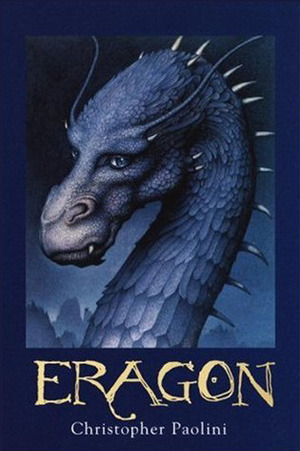 Eragon
Eragon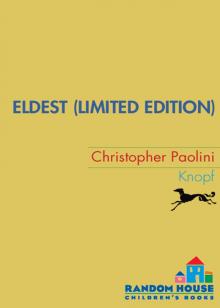 Eldest
Eldest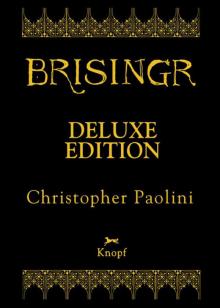 Brisingr
Brisingr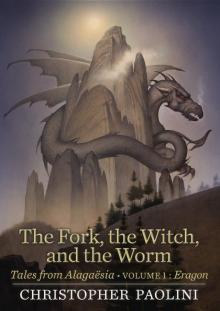 The Fork, the Witch, and the Worm
The Fork, the Witch, and the Worm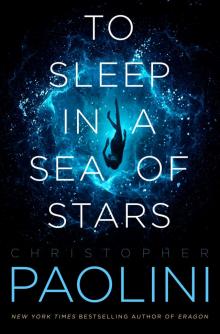 To Sleep in a Sea of Stars
To Sleep in a Sea of Stars![Eldest [en] i-2 Read online](http://i1.bookreadfree.com/i/03/19/eldest_en_i-2_preview.jpg) Eldest [en] i-2
Eldest [en] i-2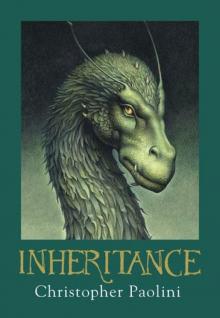 Inheritance i-4
Inheritance i-4![Brisingr [en] i-3 Read online](http://i1.bookreadfree.com/i1/03/31/brisingr_en_i-3_preview.jpg) Brisingr [en] i-3
Brisingr [en] i-3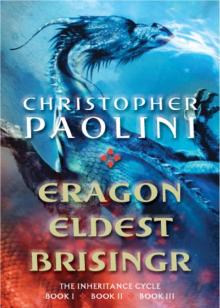 Inheritance Cycle Omnibus
Inheritance Cycle Omnibus